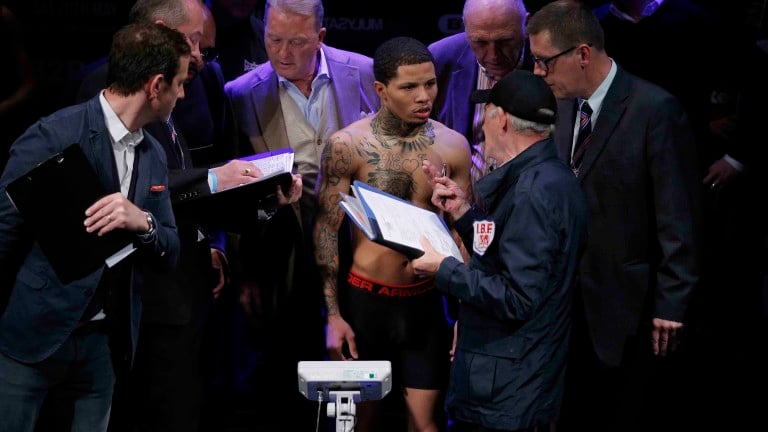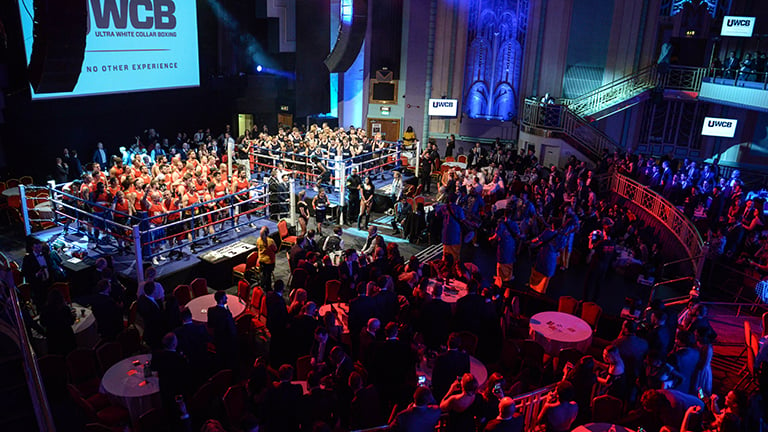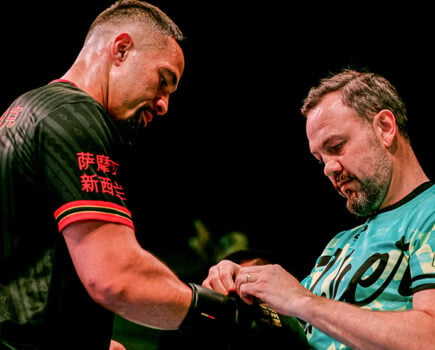IT took less than 30 seconds for the Virgin Active employee with bolt cutters to chop through a padlock and prise open the door to locker 92, and approximately half that time for the boxer standing beside him, the one who had initiated the demolition job, to realise he was opening the wrong one.
“S**t,” he said. “My stuff’s in 96.”
Prior to this, the boxer had closed the door to his locker, number 96, and left inside it his clothes, wallet and mobile phone, only to return five minutes later for his phone. The problem, however, was that in those five minutes he had seemingly forgotten the pass code required to reopen what he had earlier slammed shut. It was why a call was made to reception. It was why bolt cutters were used. It was why confusion reigned.
Still, a lesson: when hungry, when wearing a zip hoodie, a sweat suit, a large puffer jacket, tracksuit bottoms and ski salopettes, and when about to hit the sauna on a Thursday night in the hope of losing eight pounds before a Friday afternoon weigh-in, it becomes easy to lose concentration.
“Sorry, that would have never happened if I wasn’t cutting weight,” the boxer informed the man with the broken padlock in his hands. “I don’t normally make mistakes like that.”
There were other mistakes that evening. He had, for instance, forgotten to pack a spare T-shirt and shorts, both of which would have been ideal extra layers. Yet his biggest faux pas, the one that really hurt, resulted in embarrassment, an apology and an offer to reimburse the stranger with a destroyed padlock. It also motivated the boxer to put on a woolly hat, make his way to the sauna, and get this necessary part of his job – the fight within a fight, the part boxers dread more than any other – done and dusted.
“I must look like the weirdo on the train nobody wants to sit next to,” he said, throwing air punches, appearing every inch the lost slalom skier. “You sort of need to shadowbox just to validate being in here in full ski get-up. There’s not much else you can do in a sauna. I could do a Bernard Hopkins and start doing press-ups, but I don’t have the energy.”
Once sitting down, he parted his legs and lowered his head between the gap. “My head is sweaty already, but I know it’s not proper sweat,” he explained, before lifting it to take a look around. “I’m surprised the sauna’s so full. Usually when I come here it’s me on my own. And when I’m doing this on my own, it really drags. You feel a bit sorry for yourself. Every second seems like a minute.
“If you’re really dehydrated, as you always will be, it can be a horrible experience. You can’t cheat, either. There’s no point stepping outside to cool down, because if you do that you’ve got to re-heat again before sweating.”
“Excuse me, guy in the jacket,” said a girl in a swimsuit, sitting on the opposite bench. “Are you not a bit hot?”
“A little bit,” replied the boxer.
“Why are you in a sauna in a jacket?”
“Because I need to lose some weight.”
The girl and the friend sitting beside her laughed. “Seriously?” said the second one. “You don’t look overweight.”
“I have until tomorrow to lose the weight.”
“How much do you want to lose?”
“Eight pounds.”
The horror wasn’t exactly well-disguised. “Seriously? You really think you’ll lose eight pounds in one day?”
“Yeah.”
“Wow. I feel your pain. Good luck.”
The first girl wasn’t finished yet. “I thought men generally wanted to get bigger, not skinnier,” she said.
“Yeah, usually,” said the boxer. “I don’t think I’ll lose any real weight. I’ve just got to be eight pounds lighter by tomorrow.”
“How long do you have to be in here?”
“Until I lose the weight. Maybe an hour.”
“Oh, that’s terrible. I feel so sorry for you.”
He lasted 23 minutes. In that time, he begrudgingly revealed he was a professional boxer and swiftly came to understand how unnatural and unusual the sight of a boxer cutting weight the night before a weigh-in appears to the general public. This, in keeping with the ridiculousness of it all, preceded a dizzy spell, an escape, and a trip to a treadmill.
“If I had a kilo to lose as an amateur I would s**t myself,” he said. “But that’s only two pounds. The numbers go up and up as you get more experienced. You almost become a bit lazy. I know if I’ve got more than 10 pounds to cut the day before, I’ve taken the p*ss.
“Some people like to dry out four days out and lose, say, four pounds each day. But if you take four days to cut the weight then it will take four days to put it back on. If I lose all the weight the night before, it will only take the same amount of time to put it back on before the fight.”
However it’s achieved, making weight will never be a normal, healthy process. The boxer in question managed it that night, thanks to a hot bath when he got home and a zero-tolerance approach to food and water, but he didn’t feel great about it, nor look a picture of health on the scales. Gaunt, sunken eyes, skin paler than normal, he hit his target but was thankful for the three-pound leeway of a non-title fight.
Others have a far tougher time. More weight to lose. Lack of discipline. Lack of support. Less wiggle room in a championship fight. Or maybe it’s tough for others because they don’t downsize properly, intelligently, the right way. Whatever the reason, one fact remains: it is this moment in a fighter’s preparation, more so than the countless rounds of sparring, the road work and the circuits, which will potentially do the greatest amount of damage.
“Boiling down to light-heavyweight (175 pounds or 12 stone 5 pounds) was an absolute nightmare,” said Tony Bellew, who moved from light-heavyweight to cruiserweight and then ended his career as a heavyweight.
“As an amateur, I’d fight at 91 kilos, which is 14 stone 4, the cruiserweight limit. So, when I turned professional, I thought I’d do the weight easily. I walked around at 15 stone and was eating s**t as an amateur.
“For three months I went on a strict diet, trained really hard and got my weight down to about 13 stone 4. I was then told I was carrying about 10 pounds of water, listened to what people said, and got as close as I could to the weight.
“It was only when I got to around the age of 29 that s**t hit the fan. That’s when it got too much. I was doing the diet and still not losing weight. I had to learn the hard way. When I hit 30, I knew it was no longer safe. I realised that after the first (Isaac) Chilemba fight.”
Bellew’s first fight with Chilemba, back in March 2013, was one of the Liverpudlian’s worst performances as a professional. Off the pace, and unable to get to grips with the slippery South African, Bellew was relieved to come through the experience with a draw.
“I couldn’t function properly after six rounds,” he said. “I had no endurance, no durability. I was finished. It was so hard.
“Back then I was just training to make weight. I wasn’t training to improve my boxing ability. My whole focus was on making weight. That was the hardest part of my career.”
Weight struggles have myriad consequences. They can range from subpar performances, like the one Bellew produced against Chilemba first time around, and diminished punch resistance causing bad knockout defeats, to the kind of fate all boxers must put to the back of their minds in order to do the very thing they call a profession.
In the case of Richie Wenton, a 1994 British super-bantamweight title fight against Bradley Stone was the reality check he, and his sport, needed.
“We weighed in the same day,” Wenton recalled. “I was struggling for weight, but so was Bradley. We had the same problem because we were both big for 8 stone 10.
“Trust me, it’s always hard to do the weight, and regular check-ups are vital. I’m talking six weeks before, right through to the fight. Not a couple of weeks before. It takes a lot from the brain to make weight. It’s f**king dangerous. We know that now.”
Stone tragically passed away as a result of injuries suffered in his fight with Wenton and the impact of the incident shook the sport to its core.
Though it will never be known whether the battle to make weight played a part in Stone’s untimely demise, what can’t be disputed is that the abnormal process of dehydrating the brain wouldn’t have enhanced his ability to soak up punishment or outlast an opponent in a scheduled 12-round fight. Nor, of course, would the same-day weigh-in have helped Stone or Wenton’s chances of rehydrating in the hours leading up to their bout at York Hall.
“Sometimes I wonder if the day before weigh-ins are safer or not because the guys are definitely much better hydrated,” said Barry McGuigan, whose Nigerian opponent Young Ali also passed away following their fight in 1982. “But some guys, because of the 24-hour thing, might make even greater sacrifices and take even bigger risks to get down in weight knowing that they’ll have 24 hours to recuperate.
“You reach a point, however, where you’re so dry that it’s almost inconceivable that you can rehydrate properly. You might feel rehydrated, but your brain isn’t rehydrated in that 24-hour period.
“Putting a cap on what guys can weigh after a weigh-in, like the IBF do, should be implemented across the board. You shouldn’t be able to put on any more than 10 pounds after the weigh-in. If he’s gaining 20 pounds, he was obviously badly dehydrated when he was on the scales. And that’s dangerous.”
Chris Byrd, a former IBF heavyweight champion, felt the effects of losing copious amounts of weight (37 pounds) when he unwisely boxed light-heavyweight Shaun George in 2008. Out of energy, unable to even warm-up, Byrd was eventually knocked out in nine rounds. The experiment, in truth, was a disaster.
Yet Byrd, despite this, refrains from using his own woes as an example of a bad weight cut – he admits his diet wasn’t right and that he lacked a personal trainer – and instead, like McGuigan, wants to alert people to the fact big risks are being taken across the board. Risks are being taken by fighters, coaches, and by sanctioning bodies, and these risks, Byrd believes, aren’t fully appreciated by those who watch weight-drained fighters damage dehydrated brains in the name of sport.
“All the guys I have trained who have cut weight – I’m talking 30 to 40 pounds – are dying at the end,” he said. “They’re crying and screaming, ‘I can’t make the weight!’
“People don’t look at that side of it. They just look at the weight someone puts on after weighing in. It blows my mind. When Andre Dirrell fought James DeGale, he was dying to make 168 pounds. And DeGale was probably doing the same.
“They then had to wake up at eight o’clock in the morning on fight day to weigh in again, only to put on 30 more pounds afterwards.
“It’s crazy that after you make weight you’re only allowed (according to IBF rules) to put 10 pounds on before a second check the next morning. It’s stupid. People who make the rules up have obviously never fought.
“If you’re putting on 20 pounds, you must have lost a lot of weight. It’s detrimental when that happens. Now we just accept it. ‘Oh yeah, he’s a much bigger guy. He’s a much bigger guy in the ring but they weighed the same.’ No, he had a harder time making that weight. That’s why he’s so much bigger. It’s crazy.”
Frankly, if a boxer’s racking up those kind of numbers between weigh-in and first bell it’s a sure-fire sign they’re in the wrong weight division and that a desire to gain every conceivable advantage has superseded the need to stay healthy. It’s at that point you realise their priorities are back to front and that they probably require a jolt to the system. Or a move up.
“The moment I moved up in weight was one of the greatest moments in my life,” said Duke McKenzie, a world champion at flyweight, bantamweight and super-bantamweight. “I’ve never felt a greater sense of relief.
“After moving up from flyweight, I was able to eat and drink what I wanted, and you wouldn’t believe how happy it made me. When you’re happy at a weight, you can get up in the morning and have a cooked breakfast. You can have a proper lunch and an evening meal, too. Then you wake up the next morning dead on the weight. That’s all you can ask for really.”
McKenzie’s last fight as a flyweight came against Dave McAuley in 1989. It marked his first defeat as a pro. It also cost him his world title.
“The McAuley fight was a nightmare,” he said. “I’ve never felt worse going into a fight.
“We got to the weigh-in and Mickey Duff (promoter) looked at me and said, ‘McKenzie, you look like a black pair of braces.’ He said I looked ill, decimated. Whatever confidence I had disappeared in an instant.
“That was a real harrowing experience. But if I didn’t suffer that defeat, there may have been another defence, and that could have been a defence too far for me. Who knows? I could have gone on for one too many and experienced what Paul Ingle and Spencer Oliver did. I needed to go through that McAuley experience in order to do the right thing.”
In theory, improvements should come with experience and education. We should, as a sport, be maturing with age and therefore be able to correct past mistakes. Barry McGuigan stresses this, just as he stresses he’d be a “monster” if active today and if guided by his son, Shane, a professional coach well-versed in nutrition and sports science.
“The last year and a half was a struggle to make featherweight,” Barry said. “But I didn’t eat properly. I did the old atrophy where you’d eat one meal a day and shrink as opposed to eating three meals a day, cutting out all the c**p and making the weight while big, strong and muscular.
“If I’d had my son training me, I’d have been a monster at featherweight. I’d have been much, much stronger. I may even have done super-bantamweight.
“I just did it the way everybody else did back then. I was on the weight two weeks out. Nowadays most guys never do the weight until they’re on the scale. The UFC guys are even worse. They can drop a stone or two the night before.”
It’s true. With experience and education comes a temptation to push the boundaries further and gain even more of an edge, and mixed martial artists, in particular, are a great – or not so great – example of this. Liverpool’s Darren Till, a welterweight for whom cutting weight for a UFC fight against Stephen Thompson in May 2018 left him temporarily blind and unable to stand, is just one fairly recent horror story, while Uriah Hall suffered a seizure and heart attack when trying to shift weight that same year.
Boxers, too, continue to go to extreme lengths. Danny O’Connor, for instance, withdrew from a WBC super-lightweight title fight against Jose Ramirez in July 2018 after collapsing in a sauna trying to shed a final two pounds. From his hospital bed, suffering severe dehydration and suspected kidney failure, he wrote: “Heartbreaking to be rushed to the hospital and deemed medically unfit to fight the day before fighting for my first world title. I let the idea of being a world champion cloud my judgement of my personal health. Nothing is more important than my health.”
If fortunate, you might get away with it. You might lose the pounds, win the fight and, like a woman going through pregnancy, forget all about the trauma that preceded the special moment. But, rest assured, on even the lucky ones, those who live to tell the tale, an indelible impression will be left.
“The weight-making has scarred me mentally to this day and it’s still pretty bad,” said McKenzie. “I went to bed the other night and had a Boost (chocolate) bar and a cranberry and orange drink by my bed. If I wake up at three o’clock in the morning, and I’m hungry, I’ll reach over and eat it, no questions asked.
“People who have never experienced making weight will never understand how it affects you. But it does.”
Richie Wenton understands.
“When doing offshore gas projects, we’d do a lot of work on power stations and the conditions were very hot,” he said. “We’d be in boiler rooms and I’d be sweating like a pig.
“I’d notice that all the other lads were drinking water at all times. But I wouldn’t do that. I’ve always had tunnel vision when it comes to drinking water when I’m dehydrated. So, I don’t take water with me. When I’m thirsty, I won’t drink.
“I’m used to the sensation of feeling thirsty and lightheaded. I’m used to being dehydrated. I’ll go on these jobs and be sweating through T-shirt after T-shirt and won’t touch any water. The other lads look at me like I’m mad.”
Watch, for the best part of half an hour, a boxer shadowbox in a sauna while wearing a zip hoodie, sweat suit, puffer jacket, tracksuit bottoms and ski salopettes, and you will find it tough to describe this peculiar breed of human using any other adjective. It’s a mad sport, often involving mad people doing mad things for mad reasons. But it’s madder still – maddening, in fact – if it’s not done properly.






